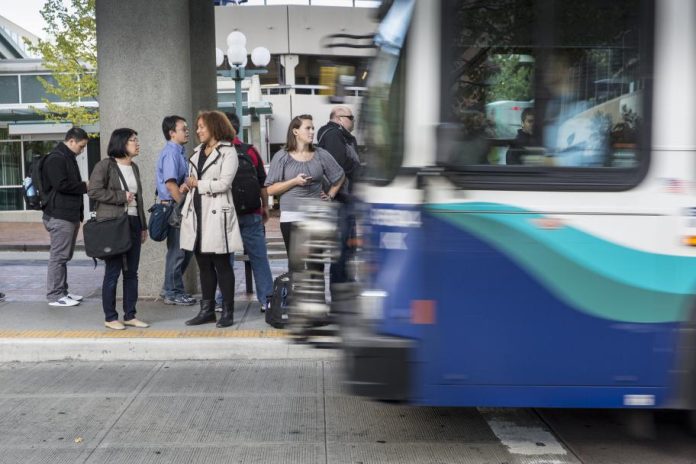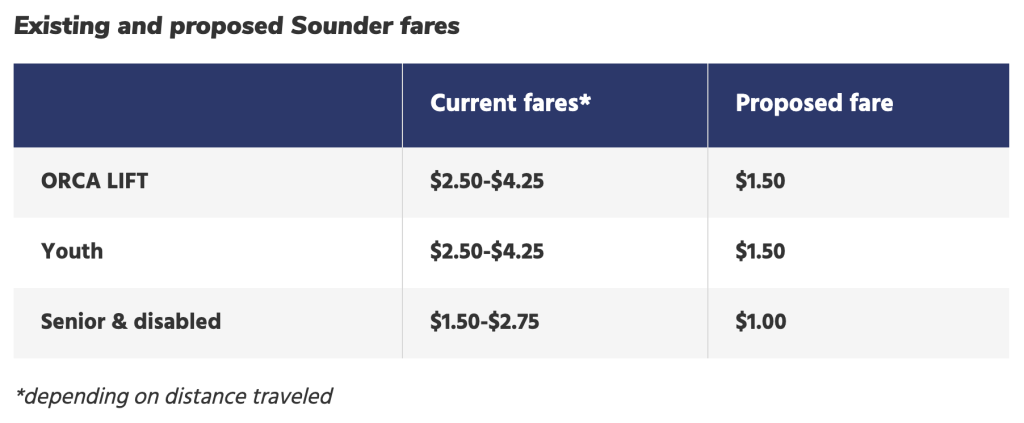
Sound Transit has been grappling with fare enforcement reimagination for the past two years in the wake of racial equity and social justice concerns, making some headway on reforms since last year. Some members of the Sound Transit Board of Directors and a bevy of community groups, however, are not satisfied with the sluggish pace of change. That has led King County Councilmember Joe McDermott, a member of the board, to take the unusual path to press ahead with deeper reforms on his own initiative.
On Thursday, the Sound Transit Executive Committee discussed further proposed changes to agency fare enforcement policies and protocols much at the behest of McDermott. The motion he put forward would direct agency staff to continue suspension of civil infractions for fare evasion during a new ambassador pilot program (which was previewed by agency agency in October) and deliver a set of recommendations, draft policy updates, and implementation plan along with a report on fare enforcement to the board by 2022. McDermott’s motion, however, garnered significant disagreement from other members of the committee principally over the issue of eliminating the courts in resolving civil infraction citation cases. That led to the committee amending the motion in an effort to potentially keep the current policy, but members otherwise supported the motion sending it to the full board next week for final consideration.
Fare enforcement briefing highlights
During the meeting, agency staff provided an update on fare enforcement reform activities and proposals to the board. Chief among these is the Fare Engagement Ambassador Pilot Program, which is set to begin next year. The pilot program will result in the replacement of fare enforcement officers on trains with ambassadors who will carry out fare inspections and educate riders on fare payment and media. Ambassadors will not issue citations (civil infractions) but rather warnings for non-payment to riders in violation of fare rules. The ambassadors will be Sound Transit staff, which will enable more direct management and training of ambassadors.
The pilot program will also entail suspension of law enforcement escalation over only non-payment of fares, further review of options to reduce fines, and continued community engagement on the pilot program and potential areas for refinement. Community engagement will be particularly focused on people of color with direct outreach to Black-led organizations, which should be a priority since agency data shows that people of color are disproportionately affected by fare enforcement practices.
To implement the pilot program, Sound Transit will need to hire and train ambassadors rapidly to launch it early next year. Ambassadors will have different uniforms from current fare enforcement officers and will be specifically trained in anti-bias and de-escalation practices. Fare enforcement officers for their part will be reallocated to security duties. Agency staff will also continue to work though policy parameters for when fares should be free or reduced during severe weather conditions.
Fare enforcement motion and debate

McDermott’s motion lays out expectations for what the fare enforcement and engagement report should include. It specifically calls for details on implementation of the Fare Enforcement Action Plan, findings derived from the Fare Engagement Ambassador Pilot Program, cost-benefit and cost-effectiveness of the fare enforcement program, and new recommendations on fare enforcement and engagement.
In developing new fare enforcement recommendations, agency staff would need to complete an equity analysis and address appropriate warning methods (e.g., written versus verbal), citation fine amounts, citation appeal process, alternatives to suspension of riders, resolving fare evasion violations without court proceedings, alternative citation resolution methods, and metrics and reporting requirements. These analyses and recommendations would also need to come with an implementation plan and proposed budget and timeline.
The motion further directs agency staff to come up with new draft language to update the agency’s Fare Enforcement Policy. The draft policy update is intended to address six specific policy areas, though there was extensive debate during the meeting about what the policy must do leading to an amendment watering down policy development that McDermott had in mind. The six policy areas for refinement include the following but could be substituted with other approaches based upon the upcoming pilot program and community engagement process:
- “Lower the citation fine amount to no more than $50”;
- “Remove court adjudication for fare evasion-only cases”;
- “Increase warnings from one to at least two in a 12-month period”;
- “Make a recommendation to update, remove, or replace the suspension policy”;
- “Remove law enforcement officers as fare enforcement officers and clearly state that law enforcement officers cannot be called to fare-evasion only situations”;
- “Add reference to bus rapid transit”.
During the meeting, members of the committee debated the scope of McDermott’s motion, largely because the draft language had directed that staff must, rather than should, develop a new policy effectively decriminalizing non-payment of fares. McDermott had intended that under the second policy area (“remove court adjudication of fare evasion-only cases”) Sound Transit would be implored to end the civil infraction escalation process to the courts once the pilot program ends.
There was disagreement over this policy area primarily by suburban boardmembers, though King County Councilmember Claudia Balducci sided with McDermott. Board Chair Kent Keel, a University Place Councilmember, held much of the floor arguing that people would try to abuse the system knowing that there are no serious civil penalties for fare violations even though the agency would still carry out other forms of fare enforcement. His reasoning was that other riders would see this behavior and opt to copy it, too, leading to a vicious fare violation spiral.
However, Keel’s theory of fare violations is not backed by actual research. King County issued a scathing report in 2018 that discredited fare enforcement efficacy, which think-tank Transit Center pointed out last year in an article arguing for decriminalizing fare evasion.
Noting that fare evasion only accounts for 1% to 7% of daily ridership for most transit agencies, Transit Center wrote: “The Seattle-area King County Auditor’s Office released a report on King County Metro’s fare evasion tactics and stated in part that ‘Fare enforcement is an important and highly visible part of Transit’s RapidRide system, but Transit is not able to determine if it is effective. The direct costs of the current fare enforcement model are about $1.7 million per year. This includes over $300,000 in court costs to process evasion fines, the vast majority of which go unpaid.'”
On the flip side, Transit Center cited many pitfalls of fare enforcement, which can put immigrants at risk of deportation, criminalizes poverty, create unsafe escalations with riders, open up opportunities for racial discrimination, and expose agencies to higher administrative costs.
Keel opined that the courts could decide in non-payment cases whether or not a rider could truly afford to have paid. But that would likely mean courts would have to make assumptions of appellants’ circumstances or create a burden on appellants to demonstrate their personal economic situation in the courts. Sound Transit CEO Peter Rogoff expressed a desire for more options than taking immediate single approaches. Thus, the committee settled on an amendment that would allow the civil infraction and court process to be retained at the end of the pilot program if the board decides to do so, which was adopted on a five-to-three vote.
If the motion is passed at the full Sound Transit Board of Directors meeting next week, agency staff will be expected to provide a full report, recommendations, implementation plan, and draft policy update by January 2022. Quarterly updates will also be expected as the process evolves.
New Sounder fares for certain categories

Separately, Sound Transit is proposing changes to the fare structure on Sounder commuter rail services. A public hearing was held last week to consider the changes that if approved would simplify and reduce fares for youth, seniors, people with disabilities, and people with low incomes. The current fare system for these ridership categories is based upon distance, but the proposal would bring the fares in line with corresponding ST Express bus and Link light rail fares, which are flat fares. Youth and people with low incomes (ORCA LIFT) would be charged $1.50 fares while seniors and people with disabilities would be charged lower $1.00 fares on Sounder services. This would allow these riders to transfer seamlessly across all Sound Transit services and other local transit agencies like King County Metro at no additional cost.
If adopted, the new Sounder fares would go into effect on March 21, 2021 as part of the spring service change. A final decision on the proposal is scheduled for the Sound Transit Board of Directors meeting next week on December 17th. Approval of the proposed fare structure seems all but assured, so riders should expect it to go into effect next year.
Look ahead on distance-based fares
While it probably is not yet on the radar, Sound Transit’s distance-based fare system may need an update in the next few years as light rail expands further north, south, and east. In a timely article this week, Alex Kvenvolden laid out one possible way to change up the fare structure approach. He points out that the existing light rail fare structure is predicated on a $2.25 base fare plus $0.05 per mile rounded to the nearest $0.25. With Link expanding so dramatically, that could become quite uncompetitive price-wise with existing fixed-route bus service covering similar corridors and distances.
“Federal Way to any [Downtown Seattle Transit Tunnel] station will cost $3.50, and to UW will cost $3.75. Tacoma to downtown Seattle will cost $4, and $4.25 to UW,” Kvenvolden wrote. “From Everett, trips downtown will cost $3.75 to $4. As expected, trips to SeaTac airport will be cheap from the south (maxing out at $3.25 from Tacoma), higher from the east (at $3.75 from downtown Redmond), and pricey from the north ($4.50 from Everett).”
The practical effect of the existing paradigm could discourage transit riders from traveling through the light rail network and depressing ridership. As a solution to this problem, Kvenvolden suggested using a logarithmic system for escalating fares by distance so that additional fare increments are charged, for instance, after the first two miles at intervals of four, then eight, and then sixteen miles (doubling distances before adding new charges) rather than at each mile with the same incremental fare amount.
Inevitably, this issue will need to become an agency and board priority in the years ahead before long-distance fare prices and inflation cause sticker shock and discourage ridership.
Stephen is a professional urban planner in Puget Sound with a passion for sustainable, livable, and diverse cities. He is especially interested in how policies, regulations, and programs can promote positive outcomes for communities. With stints in great cities like Bellingham and Cork, Stephen currently lives in Seattle. He primarily covers land use and transportation issues and has been with The Urbanist since 2014.


